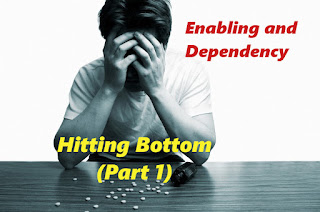While
conducting public speaking engagements on alcohol and other drug
issues, I have been asked a wide range of questions. One common
question was generally been phrased, “Is it true you cannot help
someone until they hit bottom?” An accurate response to the
question is tricky. There is both some truth and some myth contained
in the phrase, “hit bottom” and what actions may help someone
begin a life of recovery.
What it takes
for an individual suffering from AOD (alcohol and other drugs)
dependency to “hit bottom” is often defined differently for each
individual. Hitting bottom implies that an individual has reached
the point where the pain and suffering experienced is too great for
them to endure any longer and they recognize the need to change.
Everyone has a different threshold for their tolerance for pain and
suffering.
I have often
looked at some of the individuals I have worked with and wondered to
myself, “they have got to believe their current painful state is
too much to endure” and to my surprise realized I was not even
close. For me, the pain and suffering I witnessed might have been
enough, but I was not in the middle of suffering from AOD dependency.
I came to understand that some individuals had developed such a high
tolerance to pain and suffering, that for them to “hit bottom”
meant descending to a very deep, dark valley. Just how deep they
needed to go down into that valley, looked quite different from
individual to individual. Some individuals descend so deeply in
their pain and suffering, they mistake their current situation as
normal existence and all they will ever have.
One of my
colleagues told me a story, about a man he had worked with for
several months for alcoholism after a DUI conviction. This man, like
many others, simply was unwilling to see the damage his alcohol use
had created for him and others and the consequences he could
potentially experience in the future from DUI. One day, he came into
the office looking very depressed and despondent. He declared he was
ready to stop using alcohol. When he was asked why he had so
suddenly arrived at this conclusion, he explained an experience from
the day before.
Despite his
court ordered conditions which stated he was not to use alcohol or
drive, he had been doing both for several weeks. He described that
he was intoxicated and got into his car. He backed out of his
driveway, ran over his dog and killed him. He stated that while he
held his dog's lifeless body in his arms, he realized that his
careless disregard for his alcohol use and behavior had caused the
death of the only creature on this earth who loved him. Everyone
else he knew in life, he had driven away. This dog loved him without
condition and was always there for him and now he had just killed his
best and only friend. For this man, at this moment, he had hit
bottom, the consequences and the pain had become too great.
The
circumstances in any individual's life, if painful and harmful enough
from that person's perspective, may produce the conditions we call
“hitting bottom” and start them on the road to recovery. The
danger is that most individuals will die, become imprisoned, or
suffer serious mental or physical disability before they hit their
bottom and some who do get there come to believe they are beyond
hope, because they have “burned all their bridges.”
Understanding and stopping enabling behavior among family, friends
and other professionals can help get more people into recovery. In
part two of our series we will talk about the difference between
helpfulness and enabling.
This is the first of a three part series on enabling behavior with individuals suffering from AOD related problems.
Lee McDermott, Contributor


























